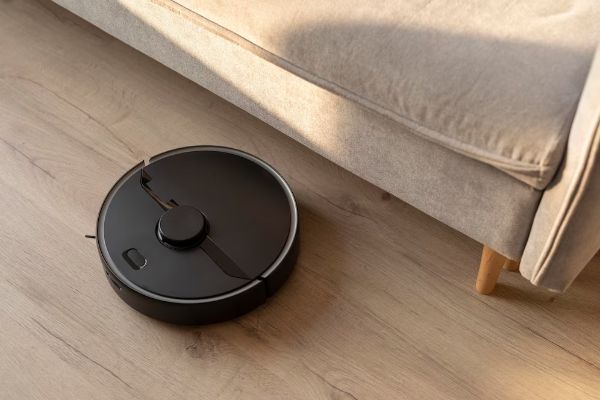Robot vacuums have revolutionized the way we clean our homes, offering convenience and efficiency. When it comes to hardwood floors, many people wonder if robot vacuums are suitable for this type of surface.

Let’s explore the benefits and considerations of using robot vacuums on hardwood floors.
- Gentle Cleaning: Robot vacuums are generally safe and gentle for hardwood floors. Unlike traditional upright vacuums with rotating brush rolls that can potentially scratch or damage the delicate surface of hardwood, robot vacuums typically employ a combination of suction and soft brushes. This ensures effective cleaning without causing harm to the wood.
- Dust and Debris Removal: Hardwood floors often accumulate dust, pet hair, and other debris, which can be effectively addressed by robot vacuums. These devices are designed to capture fine particles and larger debris, leaving your hardwood floors clean and free of loose dirt.
- Navigational Efficiency: Robot vacuums are equipped with various sensors and advanced mapping technologies, enabling them to navigate efficiently around your hardwood floors. They can detect obstacles and adjust their path accordingly, ensuring thorough coverage and cleaning.
- Low Profile Design: Robot vacuums typically have a slim and compact design, allowing them to easily maneuver under furniture and in tight spaces. This is particularly beneficial for hardwood floors, as the robot can reach areas that may be challenging to access with a traditional vacuum.
- Scheduled Cleaning: One of the significant advantages of robot vacuums is their ability to be programmed for scheduled cleanings. You can set them to clean your hardwood floors automatically, even when you’re not at home. This ensures consistent maintenance and keeps your floors looking their best.
- Hardwood Floor Maintenance: Regular cleaning plays a vital role in maintaining the appearance and longevity of hardwood floors. By using a robot vacuum on a routine basis, you can reduce the accumulation of dust and debris, minimizing the need for manual sweeping or mopping.
While robot vacuums are generally suitable for hardwood floors, there are a few factors to consider:
- Water and Moisture: Most robot vacuums are not designed to handle wet mopping or excessive moisture. Therefore, if you require mopping or deep cleaning of your hardwood floors, you may need to consider a separate device or a robot vacuum with mopping capabilities.
- Scratches and Scuff Marks: While robot vacuums are generally gentle on hardwood, it’s important to regularly check the device’s wheels and brushes for any signs of wear or damage. If not properly maintained, certain models may have wheels or brushes that could potentially cause scratches or scuff marks on the floor.
- Surface Condition: It’s advisable to evaluate the condition of your hardwood floors before using a robot vacuum. If your floors have loose boards, gaps, or uneven surfaces, the robot vacuum may encounter difficulties navigating or may cause damage. In such cases, it may be better to manually clean those areas or use a robot vacuum with more advanced navigation capabilities.
In conclusion, robot vacuums are generally a good option for cleaning hardwood floors. Their gentle cleaning action, navigational efficiency, and scheduled cleaning capabilities make them a convenient choice for maintaining the cleanliness of your hardwood surfaces.
However, it’s important to consider factors such as water and moisture, potential for scratches, and the condition of your hardwood floors to ensure the best results. By selecting a suitable robot vacuum and regularly maintaining it, you can keep your hardwood floors looking pristine with minimal effort.
